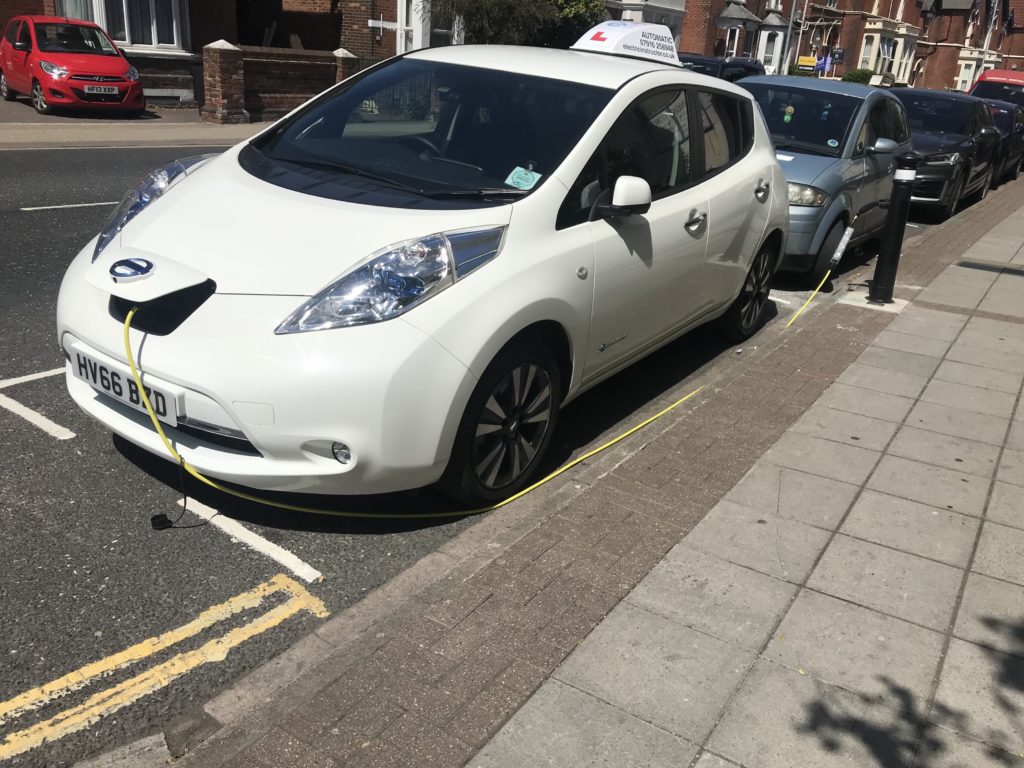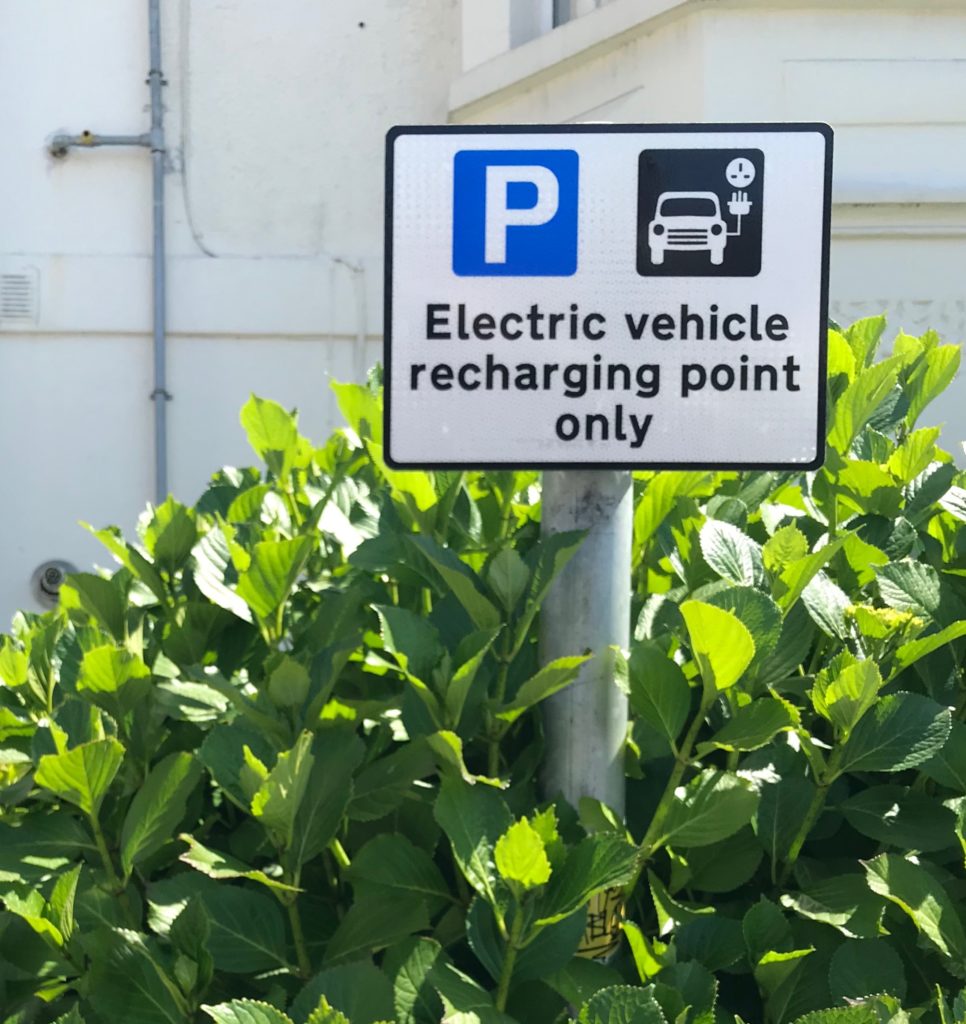
We are now at a point where there is almost no reason for anybody buy a new petrol or diesel car. If you’re buying a new car it should be electric. With decent battery ranges, a model to suit most needs available and cost of ownership parity with ICE cars your next car should be electric.
Owning an EV
Now 4 months into Nissan Leaf ownership I’ve experienced most driving situations and types of journey. The 30kW Leaf I have was replaced by a new model 2 years ago and is, in the fast moving world of electric vehicles, now considered a low range car. At about 120 miles range on a good day I have no problem doing a day’s driving lessons charging overnight then with an hour’s top up on the slow charger while I’m having lunch.
Long journeys have been a pleasure. I have realised it takes longer to do the miles on Britain’s roads than we think. I usually need a break before the car is empty and, with a bit of planning ahead, the public rapid charging network is good. So a quick break gets enough electricity in for the next leg of a journey. There have also been unexpected 100 mile round trips to my parents as my father has been ill. With my father foremost in my mind I’ve not even thought about charging. I know where the rapid chargers are and simply stop if I need some juice.
With this experience it becomes plain that with a slight change of habits just about anybody can use an electric vehicle. With 200 mile and more range normal on new vehicles there’s a car to suit just about anybody’s requirements. Although still a bit more expensive to buy, EVs cost so little to run and have such high residual values that cost of ownership is now on parity, if not better, than an ICE car. They are usually high specification models so comparable to top of the range ICE vehicles.
A Car For Every Need
Let’s consider the electric models currently available. This is by no means an extensive list and some may be missed out as new models are being announced on a regular basis, and I might have forgotten some. These are all cars you can order or register an interest in at the time of writing.
Urban Runaround
- Smart EQ
- Renault Twizzy
- VW eUp
Small hatchbacks
- Renault Zoe
- Honda e
- BMW i3
- Peugeot 208
- BMW Mini
- Vauxhall Corsa.
Medium sized hatchbacks
- Nissan Leaf 40kW
- Nissan Leaf 64kW
- VW ID
- VW eGolf
- Hyundai Ioniq
Small SUV
- Hyundai Kona
- Kia eNiro
- MG ZS
Mid Size Saloon
- Tesla Model 3.
Large SUV
- Jaguar iPace
- Audi eTron
- Tesla Model X
- Mercedes EQC
Large Saloon
- Tesla Model S
There must be a car in those lists to suit every purpose. Then there’s commercial vehicles. Lots of electric vans are being released and the Nissan eNV200 electric van is well established with a 7 seater in the range. Also camper conversions are available from specialist conversion companies.
There has to be a Maybe
Maybe I’m being a little arrogant, there has to be a maybe to this assertion that everybody buying new should buy an EV. There are two things that cause difficulty at the moment. The first is for people who have no off street parking so cannot charge overnight at home. There are solutions, by chasing councils and making it known you want an EV things can change. We now have excellent Ubitricity urban charging in Portsmouth. It made it possible for me to own an EV. The second reason is the long wait for new electric cars. There may be lots of models available, however, the demand for electric cars is so high if you order one now you’ll probably have to wait until some time in 2020 to get delivery. Most people can wait, some might not be able to.
Used Electric Cars
In this article I’m suggesting new car buyers should buy an EV. The used car market doesn’t have the supply to make it a choice for everybody. The EV with the highest sales since it’s launch in 2011 is the Nissan Leaf. The amount on our roads is small in comparison to ICE cars. Demand is high for them keeping prices high and making them difficult to find used. Currently the prices of used Nissan Leafs is increasing, not many cars increase in value as they get older. Buying a used EV requires some determination to find one. You need to offset the low running costs against the higher price of purchase. If residuals hold up the cost of ownership could still be less than an ICE car.
2025, No Justification For Buying ICE
The market is sorting out the move to EVs quicker than governments. By 2025 new car buyers will not be able to justify to themselves buying a petrol of diesel car. Electric cars will be cheaper to buy and run, battery range will be 300 to 400 miles, public charging will continue to improve. The cost of ownership of ICE cars will be much higher, buyers won’t be able to justify the higher cost of purchase and ownership. This will drive down ICE car demand and hence residual prices which will further increase cost of ownership and consequently lease costs will increase. Buyers won’t want an ICE car if it looks like residual prices are tumbling and by 2030 it will be worth very little as EVs establish themselves.
Fleet buyers buy most of the new vehicles. Businesses want the significant savings possible with EVs.
Cities with little off street parking will have to get on with installing the on street charging network otherwise people won’t want to live and work in them if car ownership is a lot more expensive.

Technology is Moving Quickly
The rate of change will drive the market. You only have to look how far we’ve come from the original 2011 Nissan Leaf. In just 8 years the Leaf has gone from a 24kW battery to 64kW in essentially the same vehicle. 64kW capacity is giving 200 to 300 miles of range in many EVs. By 2025 the density of batteries will increase further and the purchase cost decrease. New car customers will want these cars that cost less to buy, cost a fraction of the cost of ICE cars to run and have almost no servicing requirement. Because of good residuals lease costs will be lower than ICE cars. By this time a lot more people will have been exposed to EVs and realise they are quiet, fast and comfortable. They will have friends and relatives running them and realise they are simply better vehicles.
Cost of ownership will be the motivating force for EV ownership. The benefits to being kinder to the climate will motivate a lot of people as well. The fact they can run a car on renewable energy and not pollute the air in the place they live will be important.
Buy Electric
My message is simple, if you’re buying a new car buy electric and get a green energy tariff to charge it with. Politicians can sit around making noises for and against de-carbonising the economy buy it’s the market, and it’s consumers, that will drive the change before they do anything with any urgency.
